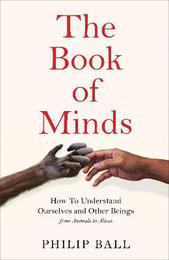
|
The Book of Minds: How to Understand Ourselves and Other Beings, From Animals to Aliens
Hardback
Main Details
| Title |
The Book of Minds: How to Understand Ourselves and Other Beings, From Animals to Aliens
|
| Authors and Contributors |
By (author) Philip Ball
|
| Physical Properties |
| Format:Hardback | | Pages:512 | | Dimensions(mm): Height 234,Width 153 |
|
| Category/Genre | Philosophy of the mind
Popular science |
|---|
| ISBN/Barcode |
9781529069143
|
| Classifications | Dewey:153.42 |
|---|
| Audience | | General | | Tertiary Education (US: College) | | Professional & Vocational | |
|---|
|
Publishing Details |
| Publisher |
Pan Macmillan
|
| Imprint |
Picador
|
| Publication Date |
23 June 2022 |
| Publication Country |
United Kingdom
|
Description
Understanding the human mind and how it relates to the world of experience has challenged scientists and philosophers for centuries. How do we even begin to think about 'minds' that are not human? That is the question explored in this ground-breaking book. Award-winning science writer Philip Ball argues that in order to understand our own minds and imagine those of others, we need to move on from considering the human mind as a standard against which all others should be measured. Science has begun to have something to say about the properties of mind; the more we learn about the minds of other creatures, from octopuses to chimpanzees, to imagine the potential minds of computers and alien intelligences, the more we can begin to see our own, and the more we can understand the diversity of the human mind, in the widest of contexts. By understanding how minds differ, we can also best understand our own.
Author Biography
Philip Ball is a freelance writer and broadcaster, and was an editor at Nature for more than twenty years. He writes regularly in the scientific and popular media and has written many books on the interactions of the sciences, the arts, and wider culture. His book Critical Mass won the 2005 Aventis Prize for Science Books. Ball is also a presenter of Science Stories, the BBC Radio 4 series on the history of science. He trained as a chemist at the University of Oxford and as a physicist at the University of Bristol. He is the author of The Modern Myths. He lives in London.
|